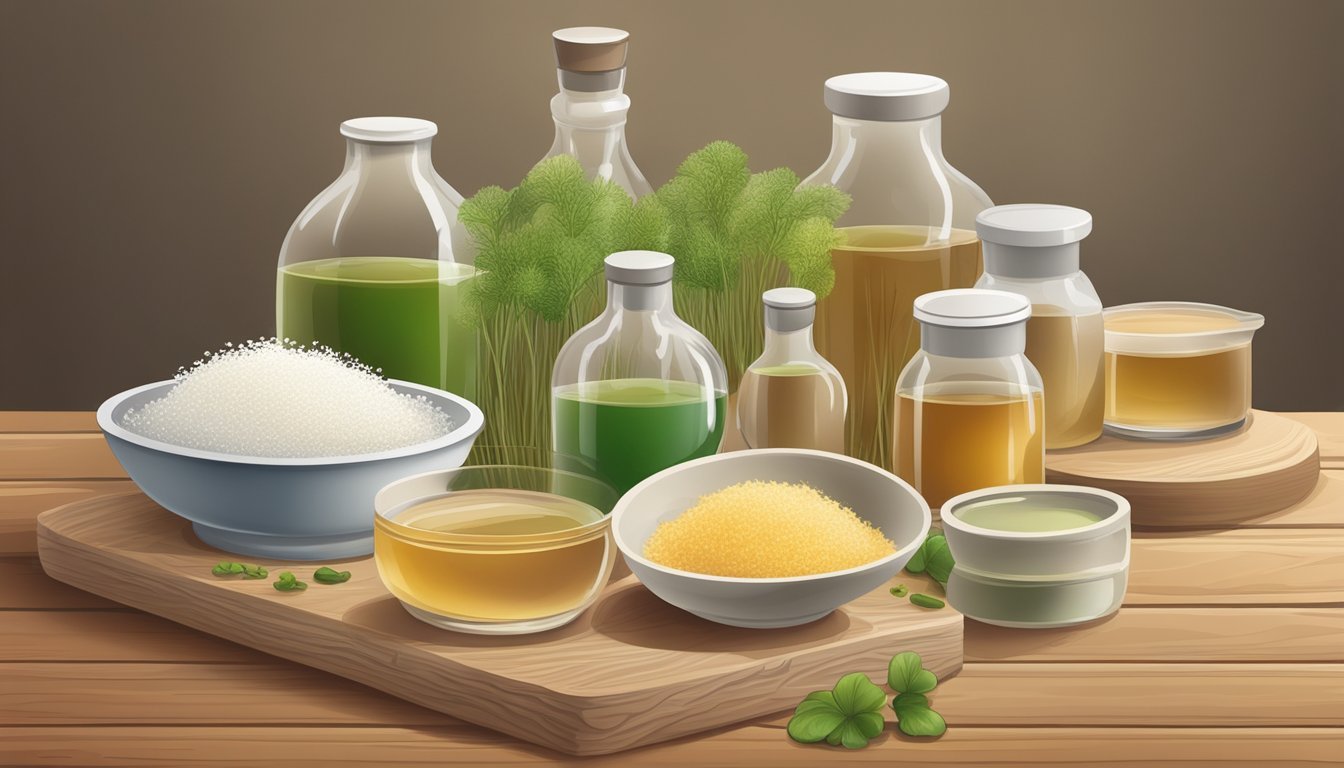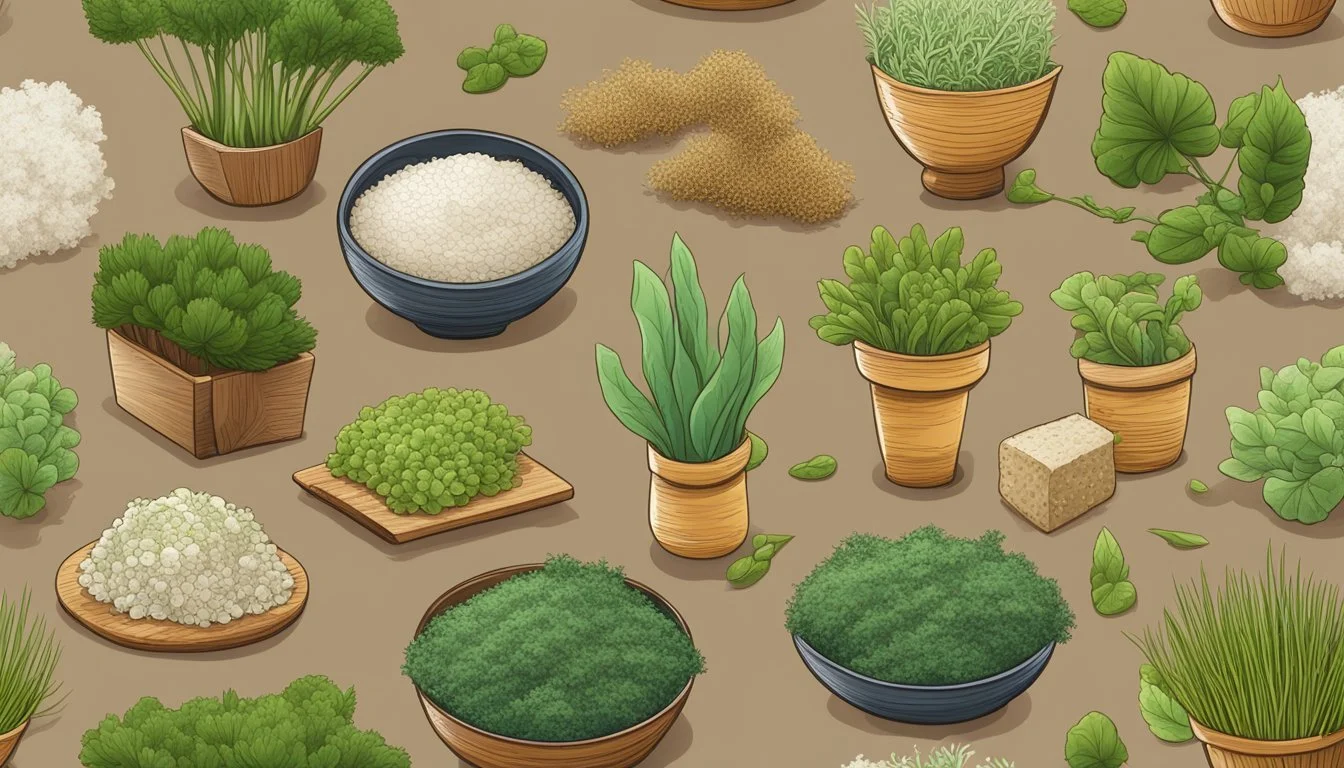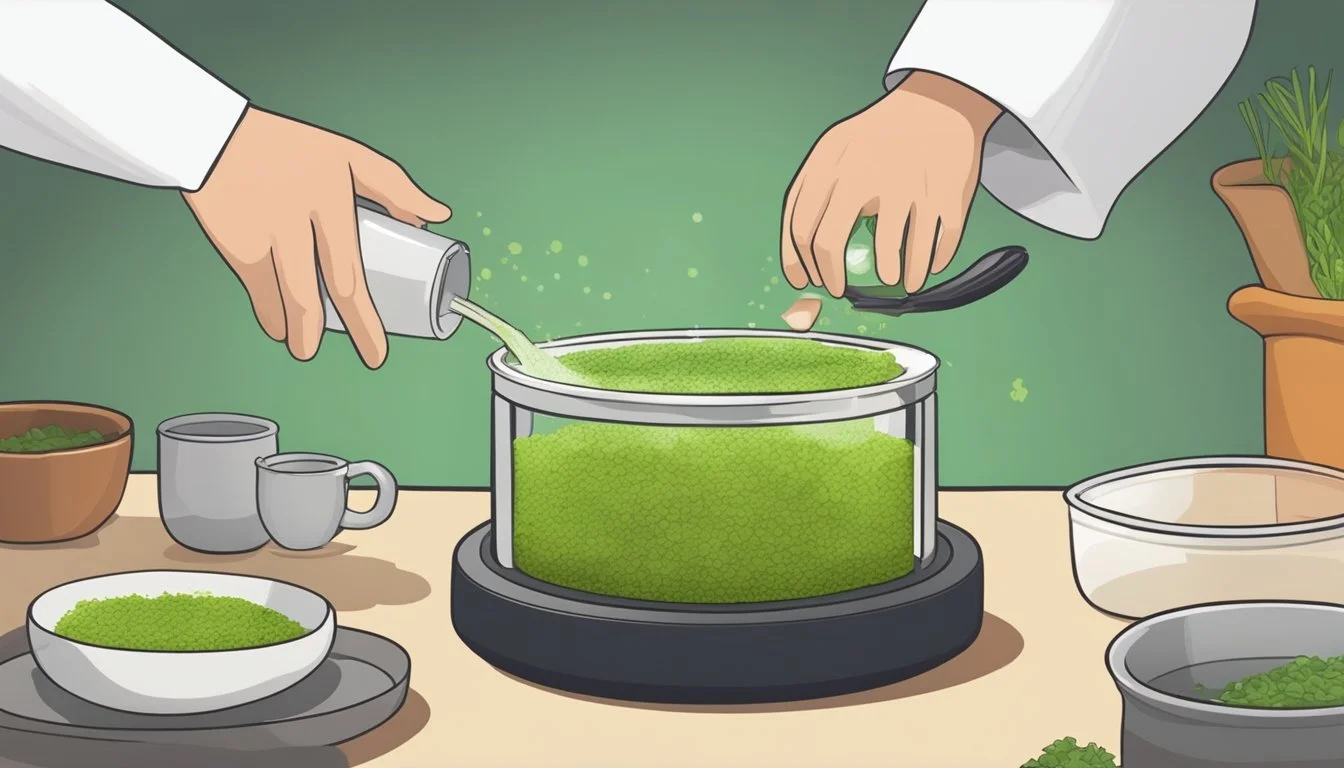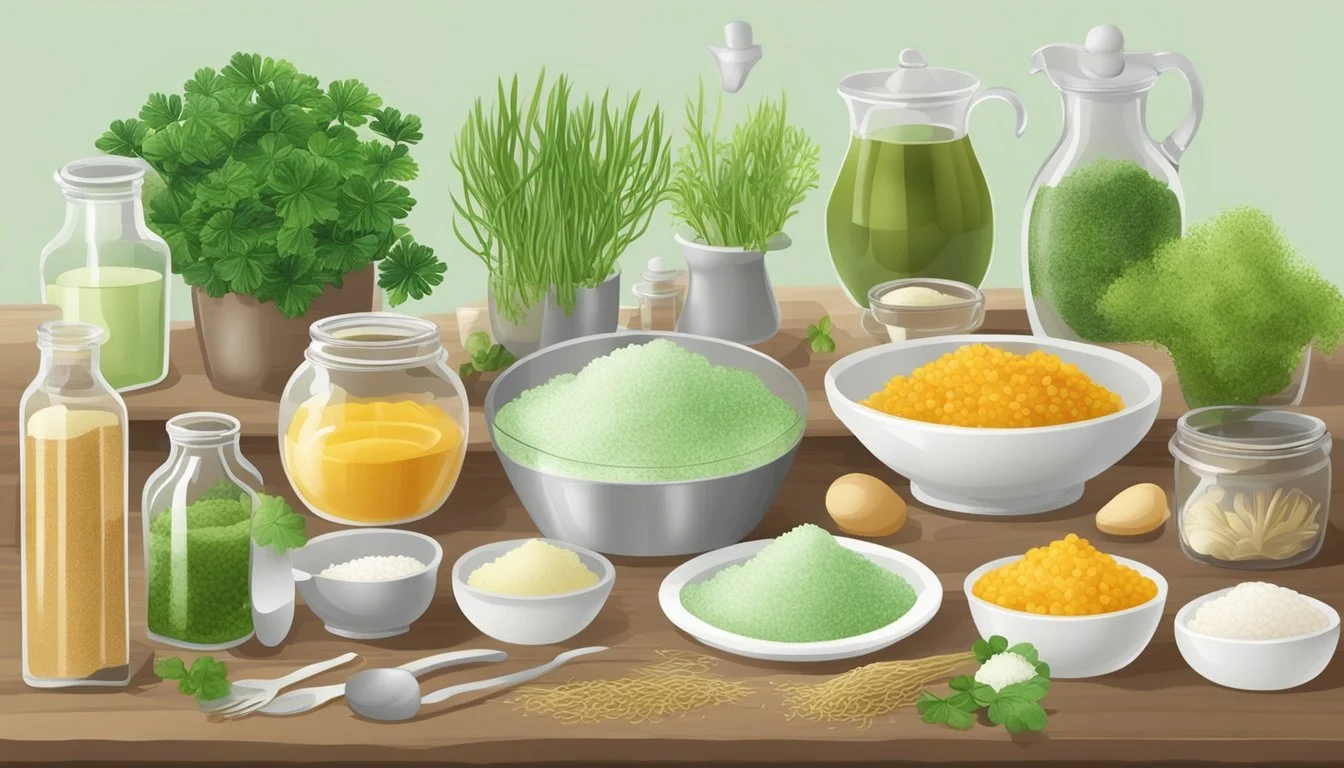Irish Moss Substitutes
Best Alternatives for Your Recipes
Finding the right substitute for Irish Moss can be essential for various culinary and brewing applications. For those engaged in homebrewing, Whirlfloc tablets are a great alternative to Irish Moss, effectively used as a fining agent due to their refined carrageenan content. This helps in clarifying the brew similarly to Irish Moss, ensuring a cleaner and more polished final product.
In cooking, agar-agar serves as an excellent substitute for Irish Moss. It's widely used in vegan and vegetarian recipes as a thickening agent, providing a similar texture without compromising on taste. This plant-based option not only offers versatility in recipes but also contributes beneficially to health by being a source of fiber.
Substituting Irish Moss in health-oriented recipes can be straightforward with alternatives like chia seeds or flaxseeds, which offer similar gelling properties. Adding these to smoothies or puddings can yield a comparable consistency, all while offering additional nutritional benefits such as essential fatty acids and antioxidants.
Understanding Irish Moss
Irish moss, also known as Chondrus crispus, is a species of red algae commonly found along the rocky parts of the Atlantic coast of Europe and North America. It is renowned for its culinary and health benefits, making it a valuable resource in various industries.
Characteristics of Irish Moss
Irish moss has flat, fan-like leaves and typically appears in dark purple or brown hues. Some varieties are bleached by the sun to achieve a golden color. It thrives in colder waters and is harvested for its high carrageenan content. Carrageenan is a natural polysaccharide used for its gelling, thickening, and stabilizing properties. This seaweed grows in dense mats and can reach a height of up to 1 to 2 inches when cultivated properly.
Culinary Uses of Irish Moss
Irish moss serves as a versatile ingredient in the culinary world. Its primary role is as a gelling agent, thickening soups, stews, and sauces. It is also used in desserts like puddings and jellies due to its ability to form a gel-like consistency when heated and then cooled. Apart from its gelling properties, it adds texture and helps emulsify ingredients in plant-based dairies, such as vegan cheese and ice cream.
Health Benefits and Concerns
Irish moss is celebrated for its nutrient-rich profile, including vitamins A, C, E, and K, as well as iodine, calcium, and potassium. These nutrients support immune function, skin health, and thyroid regulation. The presence of carrageenan in Irish moss contributes to digestive health by forming a gel-like protective layer in the gut.
Concerns primarily focus on the consumption of highly processed carrageenan, which may cause digestive issues in some individuals. Whole Irish moss in its natural form poses fewer risks compared to processed derivatives.
Incorporating Irish moss into a balanced diet can harness its benefits while minimizing potential concerns.
Common Substitutes for Irish Moss
There are several alternatives to Irish moss that can be used in brewing and cooking applications. These substitutes offer unique properties, making them effective in various recipes and processes.
Agar-Agar
Agar-Agar is a popular vegan substitute for Irish moss. Extracted from red algae, it functions as a gelling agent in foods such as jellies, puddings, and desserts.
Unlike gelatin, Agar-Agar sets at room temperature and remains firm even in warm conditions. This makes it ideal for recipes that may not be chilled. It's especially favored in vegan and vegetarian cooking due to its plant-based origin. Measuring Agar-Agar is crucial: typically, 1 teaspoon of Agar-Agar powder is equivalent to approximately 8 teaspoons of gelatin.
Gelatin
Gelatin, derived from animal collagen, is another alternative frequently used in brewing and culinary applications. While it is not vegan, it is widely accessible and effective for clarifying beverages and setting desserts.
Unflavored gelatin works well in many brewing contexts, specifically when added after fermentation to clear up sediments. In cooking, it's commonly used in making jellies and puddings. When substituting Irish moss with gelatin, the ratio is important: use approximately half the amount of gelatin as you would Irish moss.
Carrageenan Powder
Carrageenan powder, also derived from red algae, comes in various forms, including refined (known as Whirlfloc). This makes it a specialized substitute for Irish moss in brewing.
Carrageenan is often added during the boiling process of brewing to enhance the clarity and stability of beer. Its effectiveness in binding proteins helps in reducing haze in the final product. This makes carrageenan an excellent choice for brewers seeking a clear, professional-looking beverage.
Each substitute has its distinct advantages depending on the application, making them versatile alternatives for Irish moss in both brewing and cooking.
Plant-Based Alternatives
Vegan and vegetarian consumers often seek plant-based ingredients to replace Irish moss in their recipes. Common substitutes such as agar agar powder, guar gum, xanthan gum, arrowroot, and pectin provide similar functional properties.
Kanten
Kanten, also known as agar-agar, is a popular vegan substitute derived from algae. It’s commonly powdered and can replace gelatin in a 1:1 ratio. Dissolving it in hot water and letting it set at room temperature will yield a firm, jelly-like consistency without refrigeration. This makes it ideal for desserts like puddings and aspics.
Agar-agar powder has no flavor, color, or odor, preserving the original taste and appearance of recipes. Additionally, agar-agar is rich in fiber and can enhance the texture of various dishes without compromising their vegan status.
Guar Gum and Xanthan Gum
Guar gum is produced from the guar bean, while xanthan gum is fermented from simple sugars. Both are vegetable gums commonly used to thicken and stabilize food products. These gums are effective in recipes that require viscosity and emulsification. Guar gum works well in cold dishes like ice creams and salad dressings.
On the other hand, xanthan gum is excellent for gluten-free baking, preventing crumbly textures. Both gums can be used in very small quantities to achieve desired thickness, usually around 1 teaspoon per cup of liquid or flour.
Arrowroot and Pectin
Arrowroot is a starch obtained from tropical plants, and it functions well as a thickener for sauces, gravies, and puddings. Unlike cornstarch, it forms a clear gel, making it a preferred choice in recipes that require a transparent appearance.
Pectin, extracted primarily from citrus fruits, is widely used in making jams and jellies. It provides a firm set and can also stabilize juices and dairy-free yogurts. Typically, pectin is added to mixtures requiring a gel-like consistency, ensuring they are suitable for vegan diets.
Application in Brewing and Cooking
Brewers and chefs often seek alternatives to Irish moss for its various functional roles in both fields, from improving beer clarity to enhancing the texture in culinary creations.
Home Brewing with Substitutes
Home brewers use kettle finings like gelatin and whirlfloc to substitute Irish moss. These alternatives aid in clearing the wort by binding proteins during the boil. Gelatin, for instance, is typically added post-fermentation, as it conforms proteins that would otherwise cause haziness. Whirlfloc tablets, a refined form of carrageenan, are another viable option to improve beer clarity during brewing. Experimentation can determine the best alternative based on the beer type and desired texture.
Cooking and Baking Applications
In cooking and baking, Irish moss substitutes such as gelatin and agar-agar serve as thickeners and stabilizers. Gelatin provides a smooth texture to desserts like puddings and marshmallows owing to its collagen content. Agar-agar, derived from seaweed, acts as a vegetarian alternative, creating firmer textures in jellies and custards. These substitutes are versatile; experimenting with them can enhance the consistency of soups, sauces, and baked goods, meeting diverse dietary needs and culinary styles.
Culinary Techniques and Tips
Choosing the right substitute for Irish moss depends on the dish you're preparing and the desired outcome. Techniques will vary based on whether you need a gelling agent, thickener, or fining agent.
Proper Usage of Substitutes
When cooking with substitutes like agar agar or kelp noodles, proper preparation is key. Soak agar agar in water for at least 10 minutes before using it as a thickener or gelling agent.
Gelatin is another option that works well for desserts but is added after cooking. For clear beers, gelatin is a reliable fining agent, though it can strip some hop character.
Whirl floc is a refined carrageenan, ideal for use during the boil phase of brewing to clarify the final product.
Maximizing Flavor and Texture
Ensuring the best flavor and texture requires attention to detail. Kelp noodles can replace Irish moss in recipes needing texture and have a neutral taste. Soaking with baking soda and lemon juice improves the final consistency.
Agar agar creates a firm gel and is perfect for making vegan desserts and cheese. To prevent over-gelling, measure accurately and test small batches.
Experiment with different substitutes to find the best match for your recipes. For liquid applications like soups or sauces, a light hand with thickening agents maintains a natural texture. Be mindful of the interaction between different ingredients to preserve authentic flavors.
Shopping Guide for Substitutes
When seeking alternatives to Irish moss, there are a variety of options available in both supermarkets and online stores. These alternatives vary in form and functionality, from gelatin and agar-agar to vegan and gluten-free options.
Finding Substitutes in Supermarkets
In supermarkets, substitutes such as gelatin and agar-agar can often be found in the baking aisle. These products are typically available in both powdered and flaked forms.
Gelatin is widely available and can be used as a fining agent, though it should be noted that it is not suitable for vegan diets.
Agar-agar, a plant-based gelatin substitute derived from seaweed, is a versatile choice that can cater to vegan and gluten-free needs.
It is a reliable thickening agent which can be used for many culinary applications beyond brewing.
For those looking for Vegan Jel, this is another option available in some larger supermarkets, especially those with a good selection of natural and specialty foods. Vegan Jel is formulated to mimic the function of gelatin without using any animal products, making it an excellent alternative for vegan diets.
Online Purchase Options
Online stores offer a broader selection of Irish moss substitutes, making it easier to find exactly what you need. Websites specializing in brewing supplies or health foods are good places to start.
Products like powdered gelatin and agar-agar are readily available on major online platforms like Amazon.
For more specific needs, such as gluten-free or organic versions, online specialty stores provide numerous options.
Another advantage of shopping online is the ability to read reviews and compare products before making a purchase. Websites such as specialized brewing forums or health-focused retailers often carry Vegan Jel and other niche products that might not be available in local shops.
Additionally, online shopping allows you to purchase in bulk, often at a discounted price, which can be beneficial for regular use.
Innovative Recipes
Irish moss substitutes can elevate various dishes, transforming both desserts and savory meals. These ingredients provide unique textures and flavors that enhance the eating experience.
Dessert Innovations
In desserts, substitutes for Irish moss such as gelatin or agar-agar can create exciting new textures. Panna cotta made with agar-agar offers a creamy yet firm bite, perfect for a modern twist on this classic treat. Additionally, using gelatin to make gummies or marshmallows results in a chewy and enjoyable snack with natural sweeteners like fruit purees.
Incorporating these substitutes into jellies also replicates the smooth consistency of traditional recipes. Simple combinations of fruit juices and gelatin create vibrant, taste-filled jellies. Another innovative idea is to blend agar-agar in gummy bears, allowing for vegan-friendly versions.
Savory Dish Adaptations
For savory dishes, Irish moss substitutes provide a thickening and textural advantage. In soups and sauces, gelatin and agar-agar can replace the traditional seaweed to achieve the desired consistency. This adjustment works well in thickening potato-leak soups or tomato sauces, making them rich and velvety.
Agar-agar can also enhance savoury custards or aspics. These dishes typically rely on a smooth, gelatinous texture that agar-agar mimics perfectly. Equally, in savory jellied dishes, combining broths with these substitutes achieves the firm structure that's key to such recipes.
By strategically using these substitutes, chefs can fine-tune the texture and depth of both sweet and savory dishes, ensuring an exquisite culinary experience.
Environmental and Ethical Considerations
Finding substitutes for Irish moss extends beyond nutritional benefits; it significantly impacts environmental sustainability and ethical sourcing. Both aspects play crucial roles in ensuring that alternatives meet health needs without compromising ecological balance or ethical standards.
Sustainably Sourcing Substitutes
Substitutes like kelp and other varieties of red seaweed are frequently explored. These seaweeds, when harvested responsibly, provide an environmentally friendly alternative. Sustainable methods include regulated harvesting cycles that allow seaweed populations to regenerate. Harvesters often use rotational collection zones, reducing the strain on any single area.
The practice is vital in regions like India, where marine ecosystems face overexploitation. Responsible sourcing helps maintain the biodiversity and health of marine environments. Organically certified sources ensure no harmful chemicals impact the oceanic flora and fauna, supporting long-term environmental health.
Ethical Choices in Cooking Ingredients
Ethically sourced ingredients are essential for vegans and health-conscious individuals. Using alternatives like agar-agar, derived from red seaweed, offers a plant-based option suitable for vegan diets. This substitute is not only accessible but also aligns with ethical consumption values.
Frameworks for ethical sourcing consider the welfare of harvesting communities. They ensure fair trade practices and equitable profit distribution, particularly in source countries like India. Supporting fair trade certified products can improve the livelihoods of local harvesters and promote community development. Incorporating ethically sourced seaweed or plant-based substitutes helps consumers make conscious choices that benefit both people and the planet.










